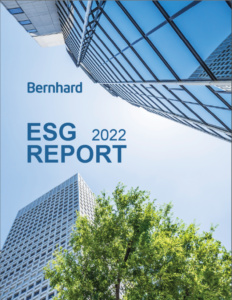Bernhard Becomes a Certified Carbon Neutral Company on Strategic Path to Net Zero
________________
Bernhard has announced the company is now carbon neutral through the deployment of compensation measures offsetting 2022 Scope 1, Scope 2, and select Scope 3 greenhouse gas (GHG) emissions.
“We began our journey by identifying and quantifying our emissions and chose to invest in the broader environmental agenda through responsible carbon offset purchases as we continue to research and develop Bernhard’s own climate action plan,” said Alyssa Jaksich, Vice President of Environment, Social, and Governance (ESG) at Bernhard.
Tracking Bernhard’s greenhouse gas emissions (GHG) has been imperative to the processes needed to understand how to achieve carbon neutrality and ultimately, net zero status. The GHG Protocol is a global program that provides standards, guidance, tools and training for business and government to measure and manage climate-warming emissions. They define three scopes of emissions that correlate to who owns those emissions and the level of control an entity has to changing those emission levels.
“We selected 2021 as our base year and included all utility consumption associated with owned and leased offices, warehouses, and fabrication shops,” said Jaksich. “We also included any emissions from our owned and leased fleet gasoline consumption, jet fuel consumed by leased aircraft, and propane and diesel used to power equipment at our fabrication shops within our GHG inventory.”
Scope 1 and Scope 2 emissions are a mandatory part of reporting for many organizations across the world and relate to systems that are within reasonable control of an entity, such as onsite and purchased energy of owned assets.
Scope 3 emissions are centered on sources of emissions that are more external to a specific organization, such as those across the supply chain. Reporting of Scope 3 emissions remains mostly voluntary, however, reduction of Scope 3 has the potential to have the largest impact.
Becoming a carbon neutral company has long been a goal of Bernhard’s ESG efforts, but the ultimate goal still lies ahead – net zero.
“As we strive towards our long-term goal of becoming net zero by 2050 or sooner, we plan to utilize a combination of reduction efforts and compensation measures,” Jaksich said. “While we work to develop Bernhard’s climate action plan in support of closing the emissions gap, this approach allows us to also work towards closing the climate finance gap. By investing in credible carbon offset projects throughout our journey, we are not only moving towards an approach that does no harm, but one that actively does good.”
Bernhard’s path to net zero will follow an “avoid, reduce and compensate” hierarchy:
- Avoid: Show preference for business decisions and actions that lead to avoided greenhouse gas emissions, thus minimizing the need for offsets.
- Reduce: Where emissions cannot be avoided, seek to reduce emissions through energy efficiency and optimization of business practices and policies.
- Compensate: Where emissions cannot be reduced or avoided, utilize offsets to neutralize remaining emissions. High-quality carbon credits will be prioritized via Bernhard’s Carbon Offset Policy.
Throughout this process, Bernhard is committed to purchasing offsets annually in accordance with our Carbon Offset Policy, while continuously evaluating and implementing strategies to ultimately exhaust our reduction efforts.
“While we made great strides in 2022 by gaining a baseline understanding of our emission-generating activities and uncovering areas where we could become more sustainable within our day-to-day operations, there is still so much work to be done,” Jaksich said. “Our path to net zero is just beginning, but we are fully committed to the journey.”




